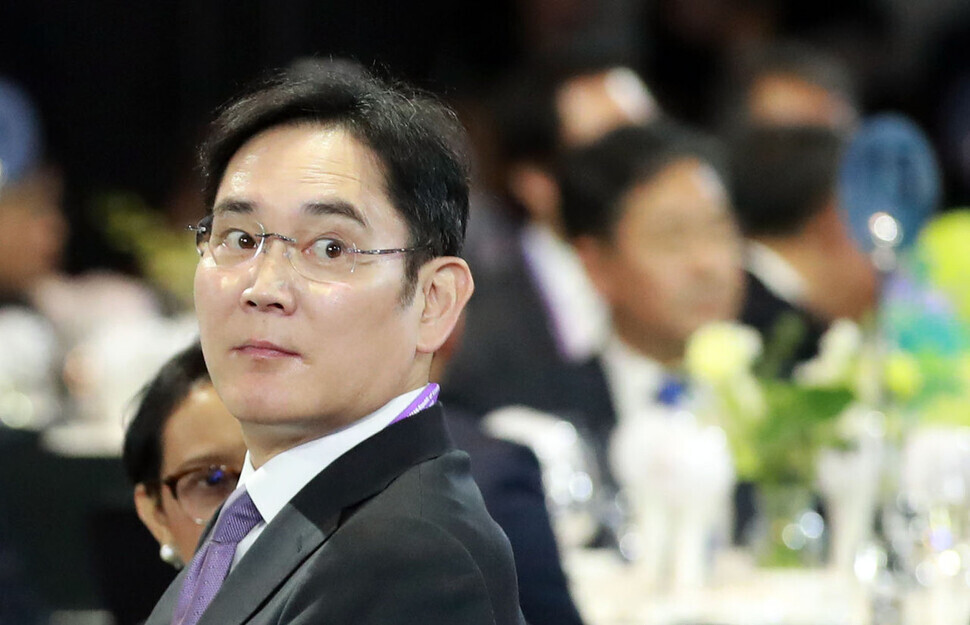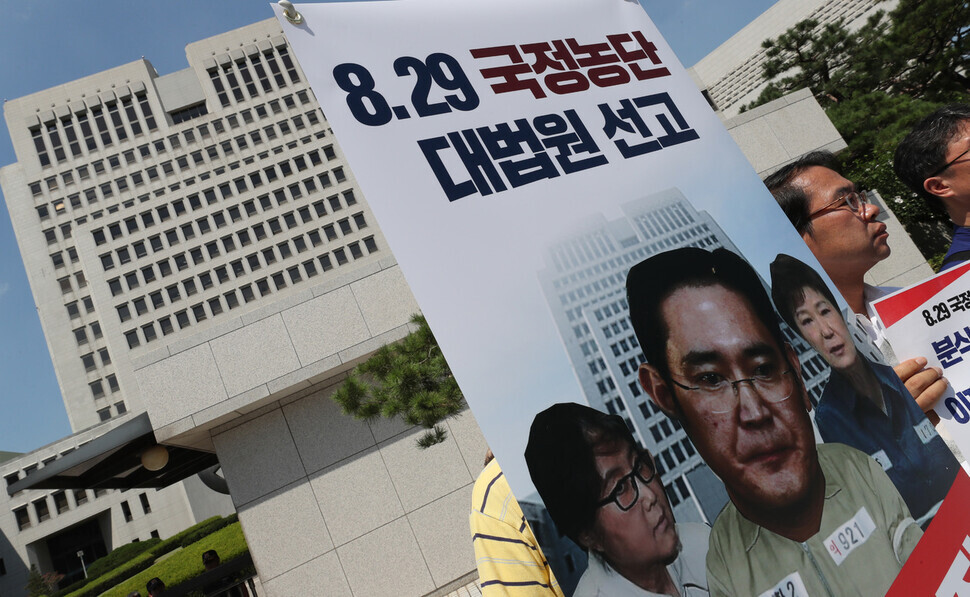hankyoreh
Links to other country sites 다른 나라 사이트 링크
[News analysis] Chaebols perform better when management misconduct is properly punished by law

South Korea is known for its chaebol, the sprawling conglomerates owned and controlled by dynastic families. But what if the owners aren’t behind the wheel — does that endanger chaebol management and cause stock prices to fall?
When a panel of outside experts advised South Korea’s public prosecutors on June 26 to halt their investigation into Samsung Electronics Vice Chairman Lee Jae-yong and not to file charges against the Samsung scion, they were reportedly influenced by the argument that Lee can play an important role in the current economic crisis, an argument generally advanced by the business community and by Samsung itself. But experts agree there’s actually little evidence or examples to back up that argument.
Samsung sales soared when Lee Jae-yong was in prisonFor one thing, Lee has already spent a year behind bars — from February 2017 to February 2018 — because of his involvement in the influence-peddling scandal that led to the impeachment of President Park Geun-hye. But Samsung Electronics’ management wasn’t obviously disrupted during that period; if anything, sales soared. The company posted 53.65 trillion won (US$44.8 billion) in operating profits in 2017, an increase of 83% from the previous year.
Since short-term performance is heavily impacted by a number of variables, including the overall situation in the global economy, those figures shouldn’t be seen as solely reflecting Lee’s absence. But at a minimum, they show that an owner’s absence does not immediately lead to management trouble. In the same context, few experts in the financial sector expect that Samsung Electronics’ performance will make a rapid downturn in the second half of this year if Lee is charged in his case involving the merger of Cheil Industries and Samsung C&T.

A number of studies have also concluded that there’s little meaningful correlation between chaebol management and the prosecution of their owners. One of those papers was a report released by the Economic Reform Research Institute (ERRI) this past January. The institute tracked changes in the stock prices of 11 chaebols controlled by individuals who were convicted of crimes between 2000 and 2018. The study found that stock prices didn’t change in a meaningful way when the chaebol owners were sent to prison but that stock prices fell when the owners were treated leniently, such as by receiving a suspended sentence. This empirical study’s findings suggest that, in contrast with the business community’s arguments, giving chaebol owners a slap on the wrist actually has a negative impact on corporate value.
Studies show corporate value rises after CEO is convicted of fraud or breach of trustSimilar results have been found in empirical studies conducted in other countries. “Quite a few studies have found that corporate value rises after a CEO is convicted of fraud or breach of trust since companies subsequently take steps to improve corporate governance. That’s also why advanced capitalist countries, including the US, mete out harsh punishment for accounting fraud,” said Lee Chang-min, a professor of business management at Hanyang University. The idea is that strictly punishing acts that undermine basic rules of business management, such as accounting practices, promotes a virtuous cycle and the development of the market as a whole.
In contrast with such research findings, the argument that the absence of a chaebol owner can impact corporate management is still being raised in the market of public opinion. “I think that Lee Jae-yong has done a good job in managing the portfolio by liquidating petrochemicals and acquiring Harman International Industries. [If Lee is indicted,] it will be harder for him to pay attention to important issues that require his decision,” said Lee Gyeong-muk, a professor of business management at Seoul National University (SNU).
Lee Gyeong-muk is concerned that the absence of an owner from important decisions about large-scale investment or M&A transactions could cause those decisions to be delayed and impact corporate value. But there are no reports over the past decade of such concerns about chaebol owner absence actually being borne.
“It would be fine for the group’s overall strategic direction to be decided by the board of company presidents,” said Lee Chang-min.
By Song Chae Kyung-hwa, staff reporter
Please direct comments or questions to [english@hani.co.kr]

Editorial・opinion
![[Column] Life on our Trisolaris [Column] Life on our Trisolaris](https://flexible.img.hani.co.kr/flexible/normal/500/300/imgdb/original/2024/0505/4817148682278544.jpg) [Column] Life on our Trisolaris
[Column] Life on our Trisolaris![[Editorial] Penalties for airing allegations against Korea’s first lady endanger free press [Editorial] Penalties for airing allegations against Korea’s first lady endanger free press](https://flexible.img.hani.co.kr/flexible/normal/500/300/imgdb/original/2024/0502/1817146398095106.jpg) [Editorial] Penalties for airing allegations against Korea’s first lady endanger free press
[Editorial] Penalties for airing allegations against Korea’s first lady endanger free press- [Editorial] Yoon must halt procurement of SM-3 interceptor missiles
- [Guest essay] Maybe Korea’s rapid population decline is an opportunity, not a crisis
- [Column] Can Yoon steer diplomacy with Russia, China back on track?
- [Column] Season 2 of special prosecutor probe may be coming to Korea soon
- [Column] Park Geun-hye déjà vu in Yoon Suk-yeol
- [Editorial] New weight of N. Korea’s nuclear threats makes dialogue all the more urgent
- [Guest essay] The real reason Korea’s new right wants to dub Rhee a founding father
- [Column] ‘Choson’: Is it time we start referring to N. Korea in its own terms?
Most viewed articles
- 1New sex-ed guidelines forbid teaching about homosexuality
- 2OECD upgrades Korea’s growth forecast from 2.2% to 2.6%
- 3[Column] Life on our Trisolaris
- 460% of young Koreans see no need to have kids after marriage
- 5[Guest essay] Maybe Korea’s rapid population decline is an opportunity, not a crisis
- 6Inside the law for a special counsel probe over a Korean Marine’s death
- 7Korean government’s compromise plan for medical reform swiftly rejected by doctors
- 8Months and months of overdue wages are pushing migrant workers in Korea into debt
- 9Two lung cancer deaths at Samsung Electronics deemed occupational in nature
- 10Trump asks why US would defend Korea, hints at hiking Seoul’s defense cost burden